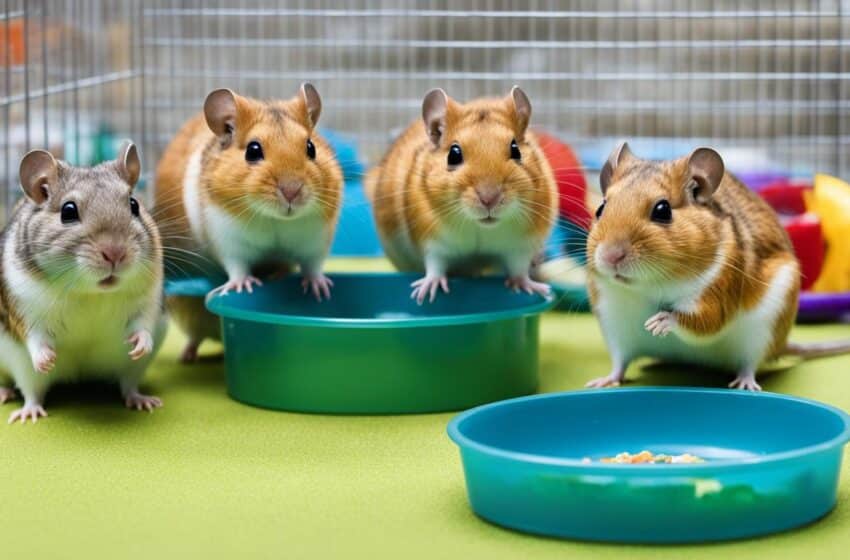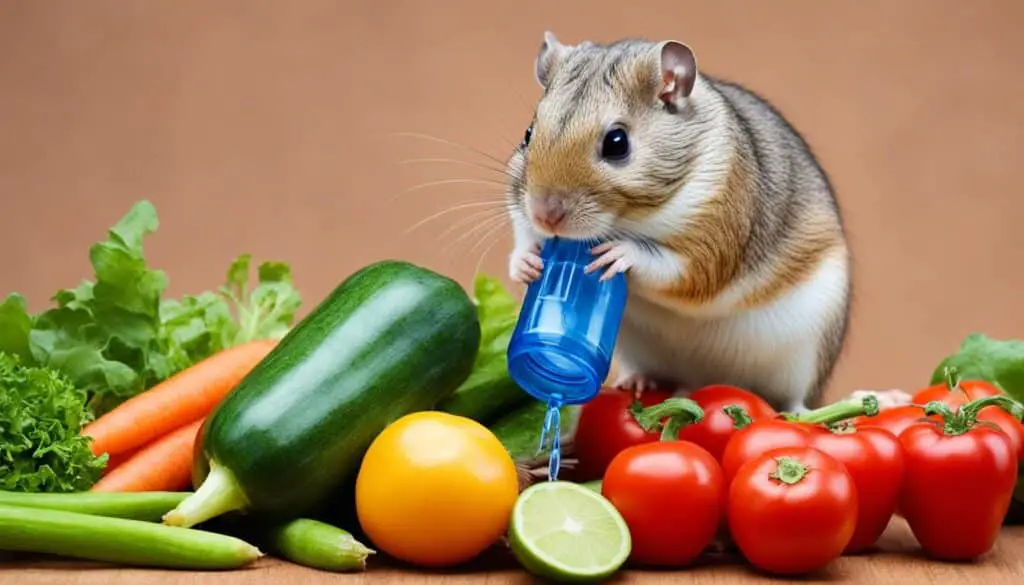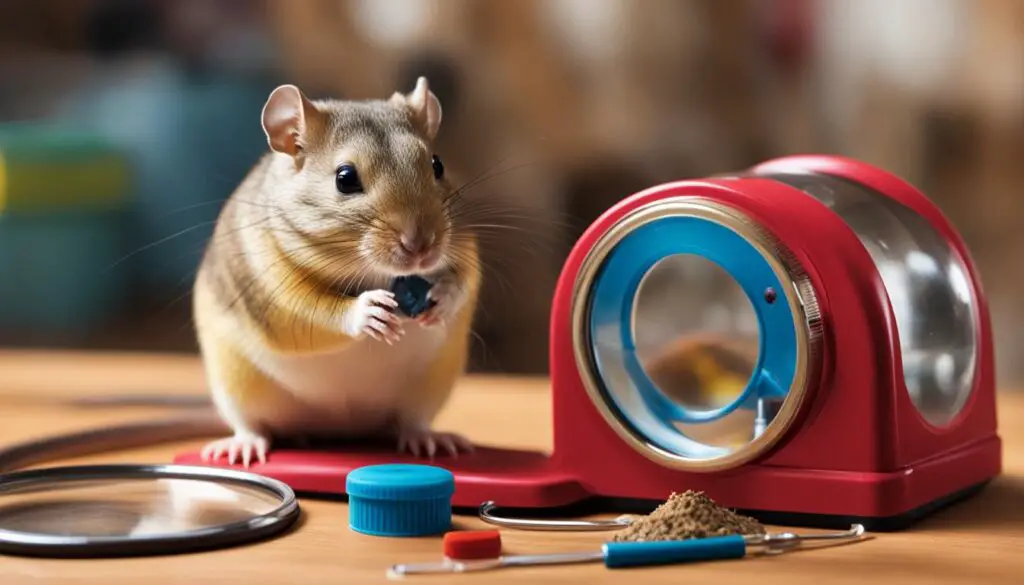Maintaining Good Health in Gerbils: Key Tips

Gerbils are small rodents that make popular pets due to their playful nature and low maintenance requirements. To ensure the well-being and longevity of your gerbil, it’s crucial to prioritize their health. In this article, I will provide you with essential health tips for gerbils, backed by factual data from reputable sources.
Key Takeaways
- Properly maintaining your gerbil’s health is essential for their well-being and longevity.
- Creating a safe and clean environment is the first step in ensuring good health for your gerbil.
- Providing a balanced diet and ensuring proper hydration is crucial for their nutrition.
- Regular exercise and mental stimulation are essential for keeping gerbils active and happy.
- Monitoring your gerbil’s health and seeking veterinarian care when needed is crucial.
Creating a Safe and Clean Environment
The first step in maintaining good health in gerbils is to create a safe and clean environment for them. A well-ventilated gerbil cage with appropriate bedding is essential for their well-being.
Gerbil habitat:
Ensure that the gerbil cage provides enough space for the gerbil to move around comfortably. A cage with multiple levels or platforms can provide additional exercise opportunities for your furry friend.
Gerbil cage:
Choose a sturdy gerbil cage with secure doors to prevent any escapes. Wire cages with a solid bottom or glass tanks with a secure mesh lid are suitable options.
Gerbil bedding:
Use bedding material that is safe and comfortable for gerbils. Aspen shavings or paper-based products, such as shredded paper or paper pellets, are ideal choices. Avoid using cedar or pine shavings, as they can be toxic to gerbils and may cause respiratory problems.
Gerbil cleanliness:
To maintain cleanliness, regularly clean the gerbil cage and remove any soiled bedding. Spot-clean the cage daily by removing feces and urine spots. Every week, thoroughly clean the cage using mild soap and water, rinsing thoroughly to remove any residue. Dry the cage completely before adding fresh bedding.
Image with gerbil habitat:
Table 1: Pros and Cons of Gerbil Bedding Options
| Bedding Option | Pros | Cons |
|---|---|---|
| Aspen shavings | – Natural and safe material – Absorbent – Controls odor effectively | – May require frequent changes – Some gerbils may have allergic reactions |
| Paper-based products (shredded paper, paper pellets) | – Environmentally friendly – Dust-free – Soft and comfortable | – May not be as absorbent as other options – May require more frequent changes |
| Cedar or pine shavings | – Aromatic scent can help control odor | – Contains potentially harmful oils – Can cause respiratory problems |
Balanced Diet and Hydration
Providing a balanced diet is crucial for the health of gerbils. A quality gerbil pellet should make up the majority of their diet, supplemented with fresh vegetables, fruits, and occasional treats. Avoid feeding them sugary or fatty foods.
It is important to ensure a constant supply of fresh, clean water to keep your gerbil hydrated. You can provide water through a water bottle or a shallow dish, making sure to avoid using water bowls, as they can become contaminated easily.
| Diet | Proper Foods | Should Avoid |
|---|---|---|
| Gerbil Pellets | A high-quality gerbil pellet as the main component of their diet, ensuring proper nutrition. | Fatty or sugary foods, as they can lead to health issues such as obesity and dental problems. |
| Fresh Vegetables and Fruits | A variety of fresh vegetables and fruits, such as carrots, broccoli, apples, and bananas, to provide essential vitamins and minerals. | Sugary fruits like grapes or citrus fruits, and vegetables harmful to gerbils like onions or garlic. |
| Treats | Occasional treats like small pieces of nuts or dried fruits to add variety and enjoyment to their diet. | Fatty or sugary treats, as they can be detrimental to their health. |

Proper nutrition and hydration are key to a gerbil’s overall health and well-being. By providing a balanced diet and fresh, clean water, you can help ensure that your gerbil thrives and maintains optimal health.
Regular Exercise and Enrichment
Gerbils are highly active animals that require regular exercise and mental stimulation for optimal health and well-being. Providing them with ample opportunities to engage in physical activities and explore their surroundings is crucial in supporting their natural instincts and preventing boredom.
A variety of toys and accessories can be incorporated into your gerbil’s habitat to promote activity and enrichment. Consider including tunnels, exercise wheels, and hiding spots to create a stimulating environment that encourages exploration and play. Rotate their toys regularly to keep them engaged and prevent monotony.
One popular toy for gerbils is the exercise wheel. It allows them to expend their abundant energy and helps to maintain their physical fitness. Make sure to choose a wheel that is appropriately sized for gerbils to prevent any injuries. Avoid wheels with rungs or wire mesh, as they can pose a risk to their delicate feet. A solid surface wheel is the best option.
Aside from exercise wheels, gerbils also enjoy exploring tunnels and burrowing. Providing them with suitable tunnels not only offers physical stimulation but also mimics their natural burrowing behavior. Opt for durable, non-toxic tunnels made from materials such as plastic or cardboard for their safety.
“Enrichment activities provide mental stimulation and can prevent unwanted behaviors, such as chewing on cage bars or excessive digging.” – Gerbil Enrichment Society
Additionally, it is essential to allow supervised out-of-cage time for gerbils to stretch their legs and explore their surroundings under close observation. Designate a safe and escape-proof area for them to roam freely, ensuring there are no small spaces or potential hazards. Always supervise their playtime to prevent any accidents or escapes.
By prioritizing regular exercise and providing a stimulating environment filled with engaging toys and opportunities for exploration, you can ensure that your gerbil stays active, healthy, and mentally fulfilled.
Monitoring and Preventing Health Issues
As a responsible gerbil owner, it is essential to keep a close eye on your furry friend’s health. By regularly monitoring their behavior, appetite, and appearance, you can quickly identify any changes that may indicate an underlying health issue.
Schedule regular check-ups with a veterinarian who specializes in small animals to ensure your gerbil receives proper veterinary care. These professionals have the expertise to perform thorough gerbil health checks and provide valuable guidance on maintaining your pet’s well-being.
Common health issues in gerbils include dental problems, respiratory infections, and parasites. Dental issues can arise from a poor diet or genetics, while respiratory infections may occur due to environmental factors such as dust or poor ventilation. Parasites, such as mites or fleas, can also affect gerbils.
Proper dental care is crucial to prevent dental problems in gerbils. Provide your gerbil with appropriate chewing materials, such as wooden toys or untreated wooden blocks, to help wear down their constantly growing teeth.
Ensuring a clean and hygienic environment for your gerbil is essential to minimize the risk of respiratory infections. Regularly remove soiled bedding, clean the cage, and provide good ventilation to prevent the buildup of harmful bacteria or irritants.
Prevention is key when it comes to dealing with parasites in gerbils. Use appropriate parasite prevention products recommended by your veterinarian to protect your gerbil from external parasites. Always follow the instructions provided by the manufacturer and consult your veterinarian if you have any concerns.
Remember, early detection and proactive measures are essential for maintaining your gerbil’s health. By observing your gerbil closely, seeking regular veterinary care, and implementing preventive measures against common health issues, you can provide your gerbil with the best possible care.
Common Health Issues in Gerbils
| Health Issue | Symptoms | Treatment |
|---|---|---|
| Dental Problems | Difficulty eating, weight loss, drooling, overgrown teeth | Professional dental care, appropriate chewing materials |
| Respiratory Infections | Sneezing, coughing, nasal discharge, labored breathing | Antibiotics prescribed by a veterinarian |
| Parasites | Scratching, fur loss, visible pests, irritation | Parasite prevention products recommended by a veterinarian |

Regular attention to your gerbil’s health, prompt veterinary care, and preventive measures can significantly contribute to their overall well-being and happiness. By staying vigilant and taking proactive steps, you can help ensure a long and healthy life for your beloved pet.
Handling and Socialization
Gentle and proper handling is crucial for the well-being of gerbils. Avoid grabbing them by the tail, as it can injure them. Instead, scoop them up gently by cupping your hands underneath their body. Socialize with your gerbil regularly by allowing them to interact with you in a safe and controlled manner. Bonding with your gerbil through positive experiences can contribute to their overall health and happiness.
Regular human interaction is essential for gerbil socialization. Interacting with your gerbil helps to build trust and strengthens your bond. Start by simply sitting near their cage and speaking softly to them. Once they become comfortable, you can progress to gentle stroking and hand feeding. Always move slowly and avoid sudden movements or loud noises that may startle them.
Providing opportunities for your gerbil to explore outside of their cage under your supervision is also beneficial. Use a gerbil-safe playpen or designate a small, secure area where they can roam freely. Ensure there are no small openings or hazards that could pose a risk to your gerbil’s safety. Letting them interact with safe toys, tunnels, and hiding spots outside of their cage will promote mental stimulation and physical exercise.
Caring for gerbils involves more than just providing food and shelter. Gerbils are social animals that crave human interaction and thrive on companionship. By handling and socializing with your gerbil, you are not only promoting their well-being but also strengthening the bond between you and your furry friend.
Conclusion
By following these key health tips for gerbils, you can ensure that your furry little friend stays healthy and happy throughout their life. It is essential to prioritize their well-being and longevity.
To start, create a safe and clean environment for your gerbil. Provide them with a well-ventilated cage, suitable bedding, and ensure regular cleaning to prevent bacterial buildup.
Additionally, focus on their diet and hydration. Offer a balanced diet consisting of quality gerbil pellets, fresh vegetables, and occasional treats. Always provide fresh, clean water to keep them properly hydrated.
Don’t forget to promote exercise and mental stimulation. Offer them various toys, tunnels, and exercise wheels to keep them active and engaged. Regular supervised out-of-cage time will also contribute to their well-being.
Monitoring and preventing health issues are crucial. Regularly observe your gerbil’s behavior, appetite, and appearance and address any changes promptly. Schedule routine check-ups with a veterinarian specializing in small animals to maintain their health.
Lastly, handle and socialize with your gerbil in a gentle and controlled manner. Avoid grabbing them by the tail and instead, scoop them up gently by cupping your hands underneath their body. Regular socialization will help bond with your gerbil and contribute to their overall well-being.
Implementing these practices will contribute to the well-being and longevity of your gerbil, bringing you joy and companionship for years to come.
FAQ
What is the first step in maintaining good health in gerbils?
The first step is to create a safe and clean environment for them by providing a well-ventilated gerbil cage with appropriate bedding and regularly cleaning the cage to prevent the buildup of harmful bacteria.
What should I feed my gerbil?
Gerbils should be primarily fed a quality gerbil pellet, supplemented with fresh vegetables, fruits, and occasional treats. It is important to avoid feeding them sugary or fatty foods.
How can I provide exercise and mental stimulation for my gerbil?
You can provide exercise and mental stimulation for your gerbil by offering tunnels, exercise wheels, hiding spots, and rotating their toys regularly. Additionally, you can allow supervised out-of-cage time in a safe and escape-proof area.
How should I monitor my gerbil’s health?
You can monitor your gerbil’s health by observing their behavior, appetite, and appearance. Any changes should be addressed promptly, and it is advisable to schedule regular check-ups with a veterinarian who specializes in small animals.
How should I handle my gerbil?
It is crucial to handle gerbils gently by scooping them up with your hands underneath their body instead of grabbing them by the tail. Regular socialization with your gerbil is also important, as it contributes to their overall health and happiness.
What are the key health tips for gerbils?
The key health tips for gerbils include creating a safe and clean environment, providing a balanced diet, promoting exercise and mental stimulation, monitoring their health, handling them gently, and offering socialization opportunities. These practices contribute to the well-being and longevity of gerbils.



